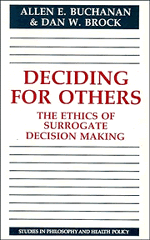
From Chance to Choice
Genetics and Justice
£38.99
- Authors:
- Allen Buchanan, University of Arizona
- Dan W. Brock, Brown University, Rhode Island
- Norman Daniels, Tufts University, Massachusetts
- Daniel Wikler, University of Wisconsin, Madison
- Date Published: January 2002
- availability: Available
- format: Paperback
- isbn: 9780521669771
£
38.99
Paperback
Other available formats:
eBook
Looking for an inspection copy?
This title is not currently available on inspection
-
This book, written by four internationally renowned bioethicists and first published in 2000, was the first systematic treatment of the fundamental ethical issues underlying the application of genetic technologies to human beings. Probing the implications of the remarkable advances in genetics, the authors ask how should these affect our understanding of distributive justice, equality of opportunity, the rights and obligations as parents, the meaning of disability, and the role of the concept of human nature in ethical theory and practice. The book offers a historical context to contemporary debate over the use of these technologies by examining the eugenics movement of the late nineteenth and early twentieth centuries. The questions raised in this book will be of interest to any reflective reader concerned about science and society and the rapid development of biotechnology, as well as to professionals in such areas as philosophy, bioethics, medical ethics, health management, law, and political science.
Read more- The first systematic account of the ethical issues underlying the application of genetic technologies
- General readership as well as broad academic and professional interest across philosophy, law, medical ethics, bio-ethics, health management, political science
- Endorsed by two leading scientists, Richard Lewontin and James Watson
Reviews & endorsements
'… it should be read by anyone who wants to think well as a citizen about choices that we must increasingly make about our future and the future of our descendants'. The New Republic
See more reviews'Anyone grappling with the extraordinarily difficult problems raised by genetic and reproductive technologies must take this book as a central text.' R. C. Lewontin, Harvard University and author of Biology as Ideology: The Doctrine of DNA
'… A benchmark treatise … a succinct and concise statement of the questions that will confront society as genetic techniques and interventions become commonplace in the years ahead.' The New England Journal of Medicine
'… Notable both for the breadth of the questions posed and the depth of the potential responses … a much needed and well reasoned ethical compass for future journeys into genetics and genomics.' Francis S. Collins, National Human Genome Research Institute, National Institutes of Health, Washington, D.C.
'If you are interested in the ethical issues surrounding the current and possible future applications of human genetics, then you will want to read this book. It is lengthy and dense, being closely argued, but it is clearly written and does not suffer from the usual problems of multi-author books. the authorial team has clearly taken great pains to argue a consistent view in stylistically consistent prose.' Human Genetics
'This book is filled with clear, nuanced and enlightening arguments. Even where one finds oneself disagreeing with the authors, one profits from their analysis and discussion … readers will be well rewarded.' The Philosophical Quarterly
'… a fascinating book that provides a systematic and in-depth analysis of the moral questions that would be raised by the use of direct genetic interventions on a large scale, including the role of the state and of the market, and of the question how social justice can be achieved in such circumstances. The book is well argued and well written; it is accessible for interested readers from a wide variety of backgrounds and professions, including geneticists, lawyers, bioethicists, politicians and journalists. Indeed it may help every reflectve citizen concerned about the implications of genetics and genomics for society to think about the dilemmas we are likely to face in the future.' Kargar
'There can be little doubt … that this book will play an important part in setting the stage for the debates that will shape the new conceptual tools we now need. this is our best guide to the uncertain future that beckons as the genetic veil of ignorance is lifted.' Practical Philosophy
'The authors of this book, all renowned bioethicists, make a remarkable attempt to help professionals grow in moral wisdom. … as an updated systematic survey of genetics-related moral questions, this will remain for years a very useful point of reference for professionals in philosophy, bioethics, law and political science.' The Heythrop Journal
Customer reviews
Not yet reviewed
Be the first to review
Review was not posted due to profanity
×Product details
- Date Published: January 2002
- format: Paperback
- isbn: 9780521669771
- length: 414 pages
- dimensions: 231 x 151 x 24 mm
- weight: 0.56kg
- contains: 1 b/w illus.
- availability: Available
Table of Contents
1. Introduction
2. Eugenics and its shadow
3. Genes, justice, and human nature
4. Positive and negative genetic interventions
5. Reproductive freedom and the prevention of harm
6. Why not the best?
7. Genetic intervention and the morality of inclusion
8. Policy implications
Appendix 1. The meaning of genetic causation, by Elliott Sober
Appendix 2. Methodology
References.Instructors have used or reviewed this title for the following courses
- Global Public Health
Sorry, this resource is locked
Please register or sign in to request access. If you are having problems accessing these resources please email [email protected]
Register Sign in» Proceed
You are now leaving the Cambridge University Press website. Your eBook purchase and download will be completed by our partner www.ebooks.com. Please see the permission section of the www.ebooks.com catalogue page for details of the print & copy limits on our eBooks.
Continue ×Are you sure you want to delete your account?
This cannot be undone.
Thank you for your feedback which will help us improve our service.
If you requested a response, we will make sure to get back to you shortly.
×










